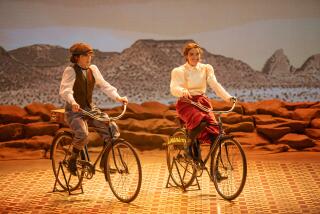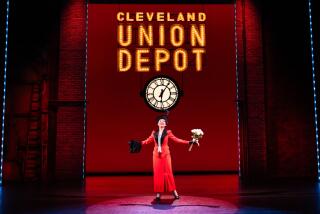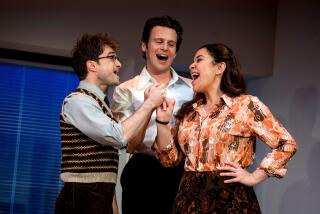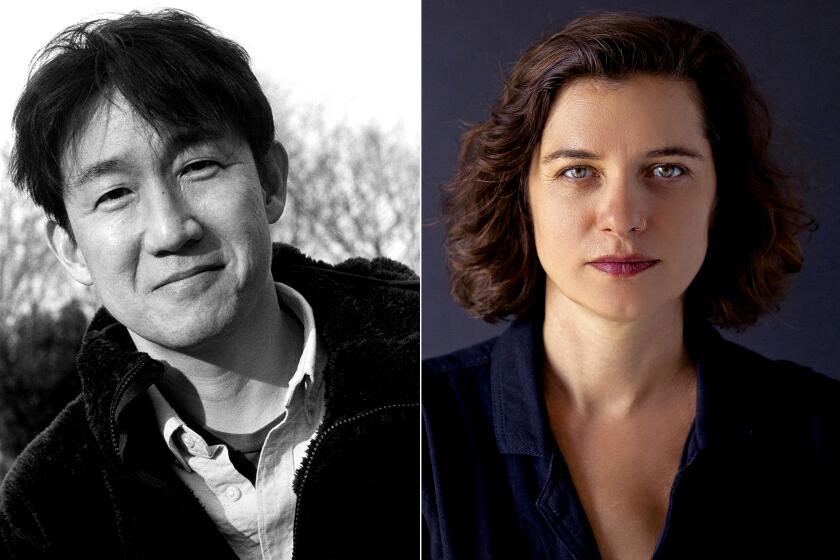Review: ‘Bright Star’ wears its old-fashioned heart on its gingham sleeve
There were times during “Bright Star,” the quaint new musical by comedy-legend-turned modern-Renaissance-man Steve Martin and singer-songwriter Edie Brickell, when I wondered if my interminable journey on I-5 had led me to the Old Globe Theatre, where the show is having its world premiere, or whether I had veered off into a time warp somewhere around Carlsbad.
In an era in which blaring jukebox musicals still dominate the scene, a time warp isn’t necessarily unwelcome. And “Bright Star,” proud of its folksiness, wears its old-fashioned heart on its gingham sleeve.
------------
FOR THE RECORD
An earlier version of this review identified the choreographer as John Rhodes. His name is Josh Rhodes.
------------
Inspired by Martin and Brickell’s Grammy Award-winning album “Love Has Come for You,” the show is distinguished by its luscious bluegrass score. (Martin co-wrote the music with Brickell, who wrote the lyrics.) The foot-stomping numbers, so foreign to my sensibility yet so delightful, made me wonder why this rootsy style of music hadn’t been tested out more often by composers gunning for Broadway.
North Carolina, where “Bright Star” is set, may be culturally distant from New York, but a band with a banjo and a fiddle is pretty hard for even the most urban audience to resist. And the musicians, housed in Walter Bobbie’s fluid production in a kind of floating cabin that moves about as the scenery shifts, keep the atmosphere strumming and twanging like a rollicking country fair.
The drawbacks of this musical’s backward-glancing manner are most notable in Martin’s book, which is often floridly melodramatic. The action takes place just after the Second World War, with a soap opera-ish back story set 22 years earlier, but stylistically, the piece hearkens back to the 19th century before psychological realism started ruining everyone’s fun.
Indeed, the storytelling is such a throwback that I was put in mind of those religious communities that prohibit automobiles, electricity and modern medicine. Here there seems to be a general ban on subtlety, plausibility and nonclimactic incident. Loose ends are also verboten, as are, strangely enough, black people. This is one of the whitest musicals I can remember seeing since my parents took me to “Grease” when I was in elementary school in the early 1970s.
The original story, which is credited to both Martin and Brickell, is apparently inspired in part by an actual event, though I’m afraid that doesn’t make this improbable yarn any easier to buy.
Billy Cane (A.J. Shively) returns from war eager to embrace his mama and tell her that he finally knows what he wants to become: a writer. In making his way home to small-town North Carolina, he sings the show’s zip-a-dee-doo-dah opening number, “Bright Star,” a gamboling melody in which he asks the heavens to smile on his path.
After Billy finds out that his mother died while he was away, it might seem that his bright star has dimmed. But this good-natured fellow, who moves through life with innocent determination, doesn’t let his grief stand in the way of his destiny.
Billy moves to Asheville, hoping to get published in the Asheville Southern Journal, but before leaving, he bids adieu to his childhood friend Margo (Hannah Elless). She has tender feelings for Billy but doesn’t want to stand in the way of his dreams. Intuiting that their story isn’t quite finished, she sings a moody love song that holds out the possibility of a reunion.
This number, “Asheville,” is one of the prettiest tunes in the show and one of two that were adapted from “Love Has Come for You.” Generally speaking, Brickell’s lyrics are at their best when love is the subject. Her approach with romance is more angular than it is with songs that drive the double-barreled plot forward.
Before listing some of those, I’ll carefully fill in some of the spoiler-rich storyline. This is a musical built on secrets, in which identities and bloodlines are shockingly revealed. Little does Billy realize when entering the office of the Asheville Southern Journal that the editor of that prestigious literary publication, Alice Murphy (Carmen Cusack), will have a transformative effect on his sense of self.
Brusque and businesslike, Alice is flanked by two eccentric underlings, Daryl (Jeff Hiller) and Lucy (Kate Loprest), both of whom add outré comic touches to Martin’s not especially humorous book.
While charting Billy’s climb from obscurity to published writer, the musical also traces Alice’s life before she renounced love and became a kingmaker of Southern authors. Her ill-starred romance with Jimmy Ray Dobbs (Wayne Alan Wilcox), son of the powerful Mayor Josiah Dobbs (Wayne Duvall), is replayed in all its over-the-top eventfulness.
So here are a few song titles from this section: “My Baby,” “Please, Don’t Take Him” and “A Man’s Gotta Do,” the last of which is sung by the villainous mayor in a tone that might have rattled Simon Legree. No surprise that none of these plot-burdened ditties managed to worm their way into my head.
Martin and Brickell’s inexperience in writing a musical reveals itself most conspicuously in what they choose to dramatize. The old rule of thumb that showing is preferable to telling doesn’t apply in cases of extreme melodrama, and in several instances, it would have been less embarrassing to simply report on what happened, leaving it to our imagination to somehow make the events seem credible and focusing our attention on the emotional fallout of these astonishing developments.
OK, as I have stressed, this is a musical that takes place just after the Second World War, but it might as well have been written at the conclusion of the Civil War. One assumes that this was deliberate, but some of the more farfetched features of the tale could be toned down without the loss of narrative magic.
The physical production is top-notch, with Eugene Lee’s scenic design, Jane Greenwood’s costumes and Japhy Weideman’s lighting contributing to the agile grace of Bobbie’s staging. Josh Rhodes’ choreography had me secretly jigging along to the folksy strains of an orchestra that was expertly led by musical director Rob Berman.
Cusack, the standout of the cast, lends freethinking Alice some feminist grit, and with her bright vocal gifts, she manages to occupy the shifting center of this very busy musical. Wilcox’s Jimmy Ray cuts a handsome figure with his singing and his acting. Together they make it easy to root for their relationship, which is marvelously captured early on in a pair of lovely songs, “Whaddya Say, Jimmy Ray?” and “By Your Side,” dreamily staged in tableau fashion.
Shively may not have the most commanding voice, but he nicely conveys Billy’s appealing innocence. Elless’ Margo is too radiant to vanish after the first half.
The optimism of this overwrought musical guarantees that audiences will go home happy. “Sun’s Gonna Shine,” the other song that evolved from Martin and Brickell’s album, doesn’t make the most cogent lyrical case. But the music is uplifting, and that’s something that never grows old.
Follow me on Twitter: @CharlesMcNulty
------------------------------------------
Where: The Old Globe, 1363 Old Globe Way, Balboa Park, San Diego
When: 7 p.m. Tuesdays and Wednesdays, 8 p.m. Thursdays and Fridays, 2 and 8 p.m. Saturdays, 2 and 7 p.m. Sundays. Ends Nov. 2.
Tickets: Start at $49
Info: (619) 234-5623 or www.TheOldGlobe.org
Running time: 2 hours, 20 minutes
More to Read
The biggest entertainment stories
Get our big stories about Hollywood, film, television, music, arts, culture and more right in your inbox as soon as they publish.
You may occasionally receive promotional content from the Los Angeles Times.







